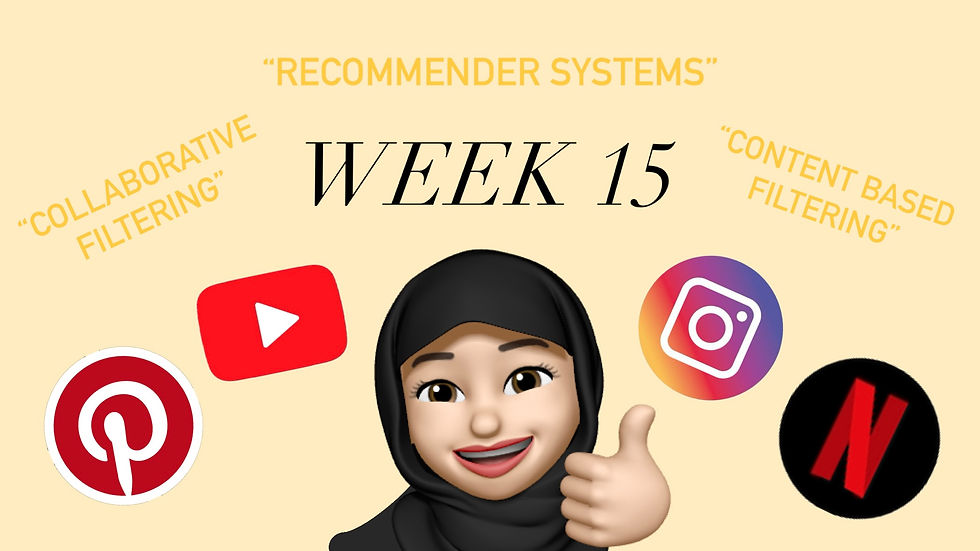Week 15 - Recommender Systems & Ai
- Lami'ah Nosarka

- Feb 11, 2024
- 2 min read
Updated: Apr 22, 2024

07/02/2024 - 14/02/2024
This week we looked into recommender systems as well as collaborative and content based filtering and their hybrid approach.
What are recommender systems?
Recommender systems are software agents that prompt interest and preferences of individual consumers and make recommendations accordingly.
Recommender systems:
AI algorithms that suggest products to consumers.
Uses Big Data and machine learning.
Considers past purchases, search history, demographics, and other factors.
Helps users discover new products and services.
Can be used to increase sales sustainability.
We also discussed the differences between Instagram and YouTube briefly in terms of recommender systems.
YOUTUBE | |
Users are fed content without control of what they are viewing | Users need to actively search for desired content |
Recommends posts and accounts based on user activities, interests, and connections. | Recommends videos based on what users have watched before, their interactions, and preferences. |
Focuses on shorter content such as images and short videos | Focuses on longer content such as videos and tutorials but recently implemented YouTube shorts |
What I think of recommender systems
I find recommender systems interesting and useful to both product owners and users as well as data analysts. These systems rely heavily on user behaviour and are not limited to e-commerce but also extend to social platforms and even streaming platforms.
I appreciate that users have the option to rate recommended content which in turn gives them some control of what they are being recommended. For example, Netflix switched from star ratings to thumbs-up, double thumbs-up or thumbs-down, aiming for more accuracy compared to the 5 star rating method. YouTube also uses thumbs-up and thumbs-down ratings to improve recommendations.
What is collaborative filtering?
Definition:
Collaborative filtering involves recommending items based on the preferences of other users who have similar tastes, without relying on specific data about the items themselves.
Example:
In an online library, collaborative filtering might suggest books to a user based on the reading habits of other users who have similar interests.
Issues:
Cold start problem: Difficulty in making accurate recommendations for new users or items with limited data.
Data reliance: Heavy dependence on user data for generating recommendations can raise privacy concerns if not handled in the correct manner.
What is content-based filtering?
Definition:
Content-based filtering involves recommending items to users based on the attributes or features of those items, rather than on the preferences of other users (collaborative filtering).
Example:
In a music app, content-based filtering might recommend artists to a user based on similar artists they have previously enjoyed or music genres they prefer.
Advantages:
Self-sufficient: Doesn't need data from other users, ensuring privacy.
Personalised: Recommendations match individual preferences based off previous activity
Hybrid Approach
This method combines collaborative and content based filtering recommendations which creates potential for more accurate recommendations.

Hybrid filtering addresses two main issues:
Prevents over-specialisation by combining different recommendation methods for more diverse suggestions.
Solves the cold start problem by offering recommendations even with limited data about new users or items.
Why use recommender systems?
Recommender systems offer a large variety of benefits for both user and product owner.
Here are 3 points on why these systems should be used:
Personalised experience: Recommender systems customise suggestions to individual preferences, improving user satisfaction.
Increase in revenue: By recommending relevant products or content, businesses can increase sales and generate more revenue.
Informed decisions: Recommender systems help users to discover new items or content, assisting in decision-making and enhancing user experience.
References



Comments